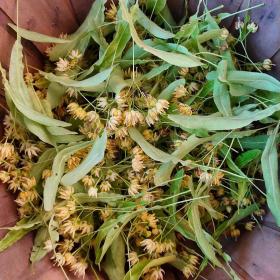Tilia x vulgaris (also known as a European lime, or Common linden) is a perennial tree of the family Tiliaceae. The x sign ( "cross" when you read the Latin name) in the name means that it is a hybrid of two types of lime trees Tilia cordata (small-leaved) and Tilia platyphyllos (large-leaved).
Common linden has heart-shaped leaves. Lime trees have small bunches of fragrant yellow flowers. After these have been pollinated, each flower produces a furry nut containing small seeds.
The Tilia x vulgaris flower is used in traditional medicine, in the form of decoctions and infusions, against inflammation of the upper respiratory tract, due to the essential oil rich in flavonoids, saponins, tannins, etc. beneficial substances. Flowers contain up to 0.06% essential oil, which composition depends on various factors like extraction method, soil, location, and climatic conditions. For example, the oil obtained by water distillation from the flowers and bracts of silver-leaved linden grown in Turkey is rich in esters, 34.8%, and 27%, respectively. The essential oil obtained from the same species grown in Greece contains mainly hydrocarbons (32.3 %) with the main representative tricosane (21.5 %) and the oxygenated terpenes linalool (13.1 %) and haxahydrofarnesyl acetone 17.7 %).
Tilia Vulgaris flower extract is a multifunctional ingredient for skin care applications, beneficial effects include anti-inflammatory, soothing, antiseptic, antioxidant, and skin conditioning action. It has a pleasant scent, so can be used as a masking agent.











